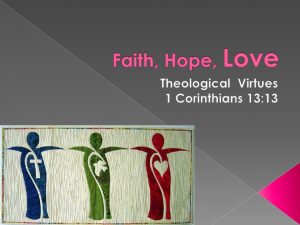…that faith, hope, and love are “theological virtues” derived from St. Paul’s First Letter to the Corinthians? Faith, the first of these, is used to mean “belief” in John’s Gospel, and St. Paul often uses it this way, too. But in English, where belief is a sort of “hanging on,” faith is a  clear “letting go.” Hope is the second virtue. It does not mean that we hope to get what we want or avoid what we dread. Rather, it is ‘throwing’ ourselves at God, Who will carry us through, not around, the difficulties we face in this life. And last is Love, the greatest virtue. St. Thomas Aquinas defined perfect love as dying for the sake of others who do not deserve the sacrifice. Our Lord, Jesus Christ, is the embodiment of these three virtues. is a sort of “hanging on,” faith is a clear “letting go.” Hope is the second virtue. It does not mean
clear “letting go.” Hope is the second virtue. It does not mean that we hope to get what we want or avoid what we dread. Rather, it is ‘throwing’ ourselves at God, Who will carry us through, not around, the difficulties we face in this life. And last is Love, the greatest virtue. St. Thomas Aquinas defined perfect love as dying for the sake of others who do not deserve the sacrifice. Our Lord, Jesus Christ, is the embodiment of these three virtues. is a sort of “hanging on,” faith is a clear “letting go.” Hope is the second virtue. It does not mean
that we hope to get what we want or avoid what we dread. Rather, it is ‘throwing’ ourselves at God, Who will carry us through, not around, the difficulties we face in this life. And last is Love, the greatest virtue. St. Thomas Aquinas defined perfect love as dying for the sake of others who do not deserve the sacrifice. Our Lord, Jesus Christ, is the embodiment of these three virtues.
